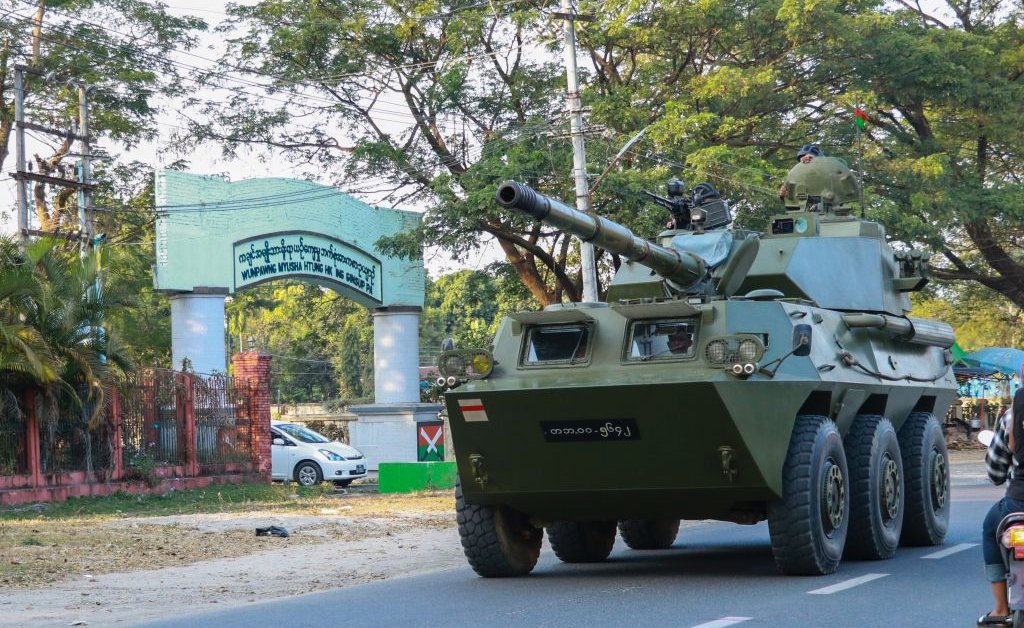[ad_1]
On February 1, Myanmar’s military arrested leaders of the country’s civilian-led government and declared a one-year state of emergency. After a decade-long experiment with limited direct democracy, the junta is firmly in charge, and a small nation that once seemed to offer a roadmap for transition out of armed dictatorship is now once again under lockdown.
For nearly half a century, the army ruled this southeast Asian country. Then, in 2011, desperate to draw more investment into the country (and their own pockets) without becoming dangerously dependent on China, the generals cut a power-sharing deal with opposition leader Daw Aung San Suu Kyi and her National League for Democracy (NLD).
Though forbidden to hold office herself, Aung San Suu Kyi led her party to a landslide win in 2015 election and an even bigger victory over an army-backed opposition party on November 8. (Turnout was 70%, despite the pandemic, and the NLD won 83% of parliamentary seats.) The military, embarrassed by the scale of the NLD’s victory, claimed the election was rigged and demanded a recount. Talks with the NLD went nowhere, and tanks and troops then hit the streets before a new session of parliament could ratify the results. The coup is now accomplished.
This is an ugly story of fragile democracy and brute force, but it is not a simple morality play. Aung San Suu Kyi is a complicated figure. The sacrifice of her freedom—she spent 15 years under house arrest between 1989 and 2010—and the force of her personality made the 2011 power-sharing deal possible. But when the army murdered members of the mostly Muslim Rohingya minority in 2017 and drove 750,000 more from the country, Aung San Suu Kyi publicly defended her country. And the November election was hardly free and fair—though not for the reasons the military claims. Rohingya and other ethnic and religious minorities were largely blocked from voting.
Will international pressure reverse this coup? No. The Biden administration, facing its first spontaneous foreign-policy test, will surely threaten, and then impose, further sanctions. The Obama administration worked hard to encourage Myanmar’s tentative steps toward democracy. The U.S. eased previous sanctions designed to bolster Aung San Suu Kyi at the military’s expense, and Obama visited Myanmar in 2012. But the administration ignored warnings from rights groups that a full lifting of sanctions should wait for better treatment of the Rohingya and other ethnic and religious minorities.
U.S. and European financial penalties and restrictions on exports of military equipment to Myanmar in response to the ethnic cleansing of the Rohingya have accomplished little. Stricter measures are unlikely to impress army chief Min Aung Hlaing, who has far more to fear from democratization in Myanmar than from threats by Western officials. Continued military control of lucrative state properties ensures the generals will prosper even as their country buckles.
Nor will it be lost on anyone in the Biden administration that this is an especially awkward moment for the U.S. to defend democracy from attempts to seize power by those who claim election fraud. (Biden also knows that, unlike the situation in Washington, where the American military offered no support for those who would overturn the November election, the power-grab in Myanmar is an actual coup backed by overwhelming force.) Myanmar’s neighbors will do nothing to further isolate the country. Japan and the Southeast Asian democracies will mind their own business. Thailand, where the military remains in power after a successful coup in 2014, will be only too happy to continue trade with Myanmar.
The winner is China, which will now become an ever-more important source of financial help as Western sanctions take a toll. As part of its Belt and Road infrastructure investment project, the two countries have already signed deals for construction of a China-Myanmar Economic Corridor, a project that will boost commerce for Myanmar while giving China land access via highway and rail to a strategically valuable deep-water Indian Ocean port on Myanmar’s west coast.
When Myanmar’s generals made their democracy deal a decade ago, they hoped to open the country to both Western and Chinese investment. Now that they’ve clawed back full power, they’ll depend almost exclusively on China. Beijing is happy to do business with anyone in power in Myanmar, but the Western retreat will be welcome news.
[ad_2]
Source link








